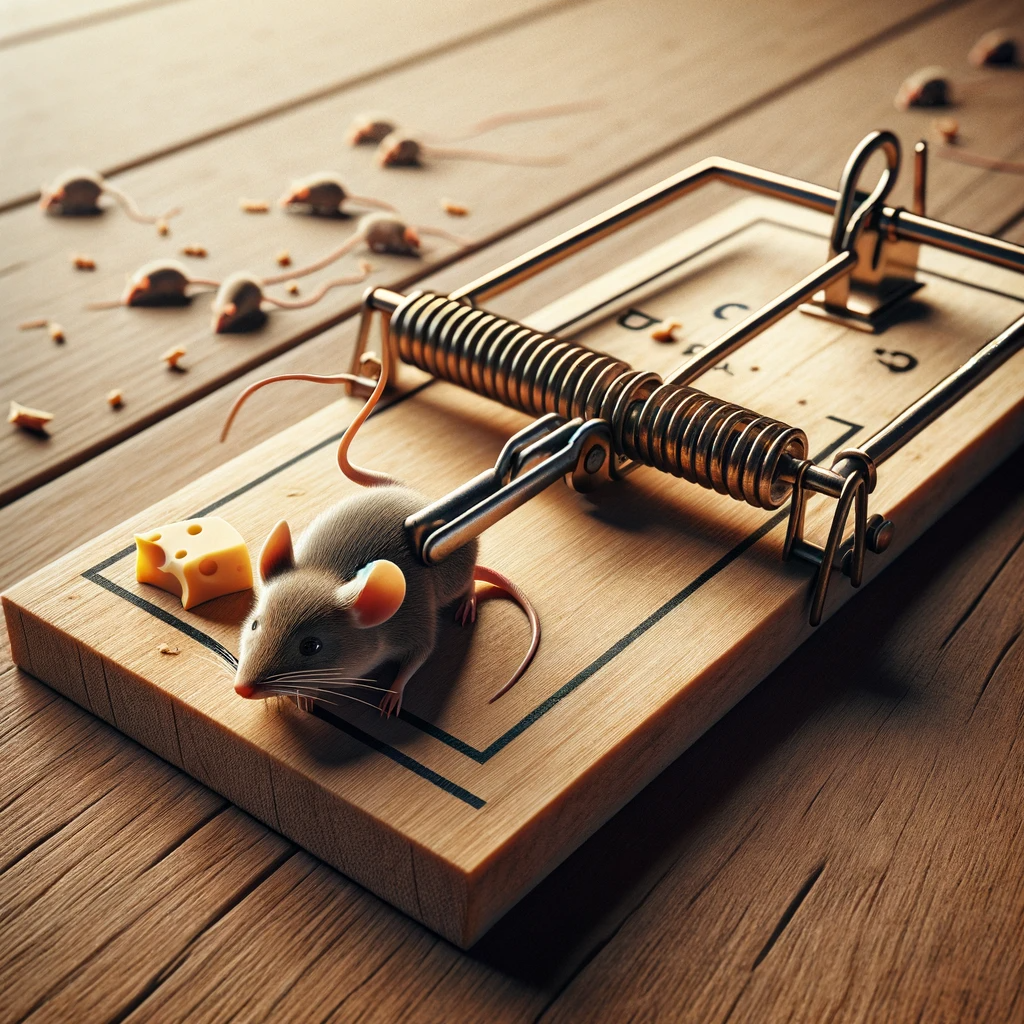Trap
Definition
"Trap" primarily refers to a device or enclosure designed to catch and retain animals, typically by allowing entry but not exit or by catching hold of a part of the body. It also can mean a situation that deceives or ensnares someone.
Parts of Speech
- Noun
- Verb
Pronunciation
IPA Pronunciation:
- American English: /træp/
- British English: /træp/
Respelling:
- American: trap
- British: trap
Etymology
The term "trap" derives from the Old English "treppan" (to tread or step), which itself comes from the Proto-Germanic *trap-, a root forming words associated with stepping. The sense of a device for catching animals dates from the late Old English period.
Derivatives
- Trapper (noun)
- Traplike (adjective)
- Trapping (noun)
- Entrap (verb)
- Trapped (adjective)
Synonyms
- Snare
- Ambush
- Decoy
Antonyms
- Release
- Liberate
- Free
Usage
- As a noun: "He set a trap for rabbits."
- As a verb: "They were trapped in the cave for days."
Related Terms
- Entrapment: The act of causing someone to commit an offense they would otherwise have been unlikely to commit.
- Bait: Something used to lure animals or fish into a trap.
- Capture: To take into one's possession or control by force.
Detailed Definition
As a Noun
- A device for catching and holding animals, typically by allowing entry but preventing escape: "He used a mousetrap to catch the mice in his house."
- A situation that is difficult or impossible to escape from: "The contract turned out to be a financial trap."
- A device for hurling objects, such as a light two-wheeled carriage in horse racing: "They rode in a horse-drawn trap to the fair."
- A trick or arrangement designed to catch someone in a more general sense: "The question was a trap to catch her off guard."
As a Verb
- To catch an animal in a trap: "They trapped several foxes in the forest."
- To prevent someone from escaping from a place: "The snowstorm trapped them in the cabin."
- To trick or deceive someone, leading them into a mistake or undesirable situation: "He felt he was trapped into signing the contract."
trap



🇨🇳 Mandarin
- 陷阱 (xiànjǐng) (physical trap or metaphorical)
- IPA: /ɕjɛn˨˩ t͡ɕiŋ˨˩/
- Respelling: shyen-jing
🇮🇳 Hindi
- पासा (pāsā) (trap for catching animals)
- IPA: /paː.saː/
- Respelling: paa-saa
- जाल (jāl) (trap in a metaphorical sense)
- IPA: /d͡ʒaːl/
- Respelling: jaal
🇪🇸 Spanish
- Trampa (for both physical and metaphorical trap)
- IPA: /ˈtram.pa/
- Respelling: tram-pa
🇫🇷 French
- Piège (for both physical and metaphorical trap)
- IPA: /pjɛʒ/
- Respelling: pyezh
🇸🇦 Modern Standard Arabic
- فخ (fakh) (physical trap)
- IPA: /fax/
- Respelling: fakh
- مصيدة (maṣīdah) (metaphorical trap)
- IPA: /maˈsiːdah/
- Respelling: ma-see-dah
🇧🇩 Bengali
- ফাঁদ (phāṁda) (physical trap)
- IPA: /pʰãd̪a/
- Respelling: phaan-da
🇷🇺 Russian
- Ловушка (lovushka) (for both physical and metaphorical trap)
- IPA: /ləˈvuʂkə/
- Respelling: lo-vush-ka
🇵🇹 Portuguese
- Armadilha (for both physical and metaphorical trap)
- IPA: /aʁ.maˈdʒi.ʎɐ/
- Respelling: ar-ma-djee-lya
🇮🇩 Indonesian
- Perangkap (physical trap)
- IPA: /pəˈraŋ.kap/
- Respelling: pe-rang-kap
🇩🇪 German
- Falle (for both physical and metaphorical trap)
- IPA: /ˈfalə/
- Respelling: fal-leh
🇯🇵 Japanese
- 罠 (wana) (for both physical and metaphorical trap)
- IPA: /wana/
- Respelling: wa-na
🇻🇳 Vietnamese
- Bẫy (for both physical and metaphorical trap)
- IPA: /ɓa᷉ːj˧˥/
- Respelling: bay
🇰🇷 Korean
- 함정 (hamjeong) (for both physical and metaphorical trap)
- IPA: /ham.dʑʌŋ/
- Respelling: ham-jung
🇹🇷 Turkish
- Tuzak (for both physical and metaphorical trap)
- IPA: /tuˈzak/
- Respelling: too-zak
🇵🇰 Urdu
- پھاندا (phāndā) (trap for catching animals)
- IPA: /pʰɑːn.daː/
- Respelling: phaan-daa





